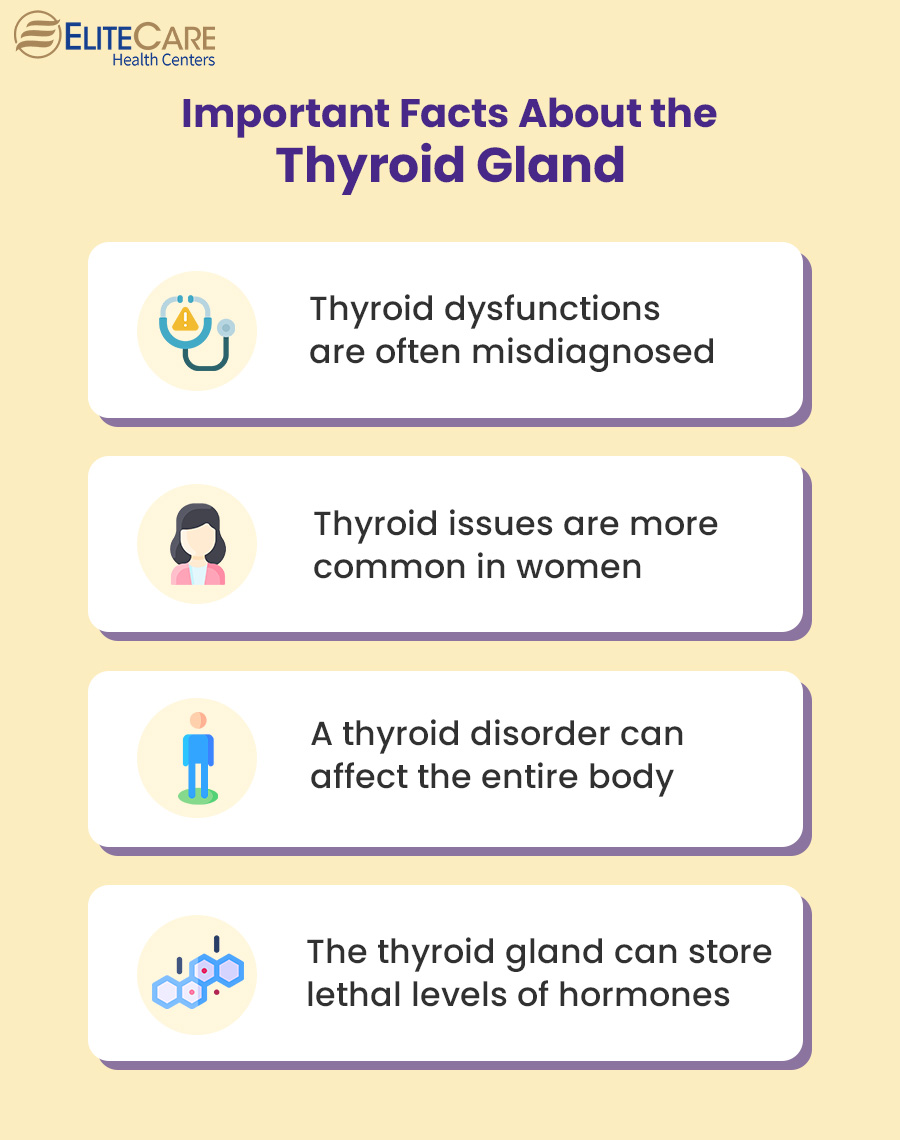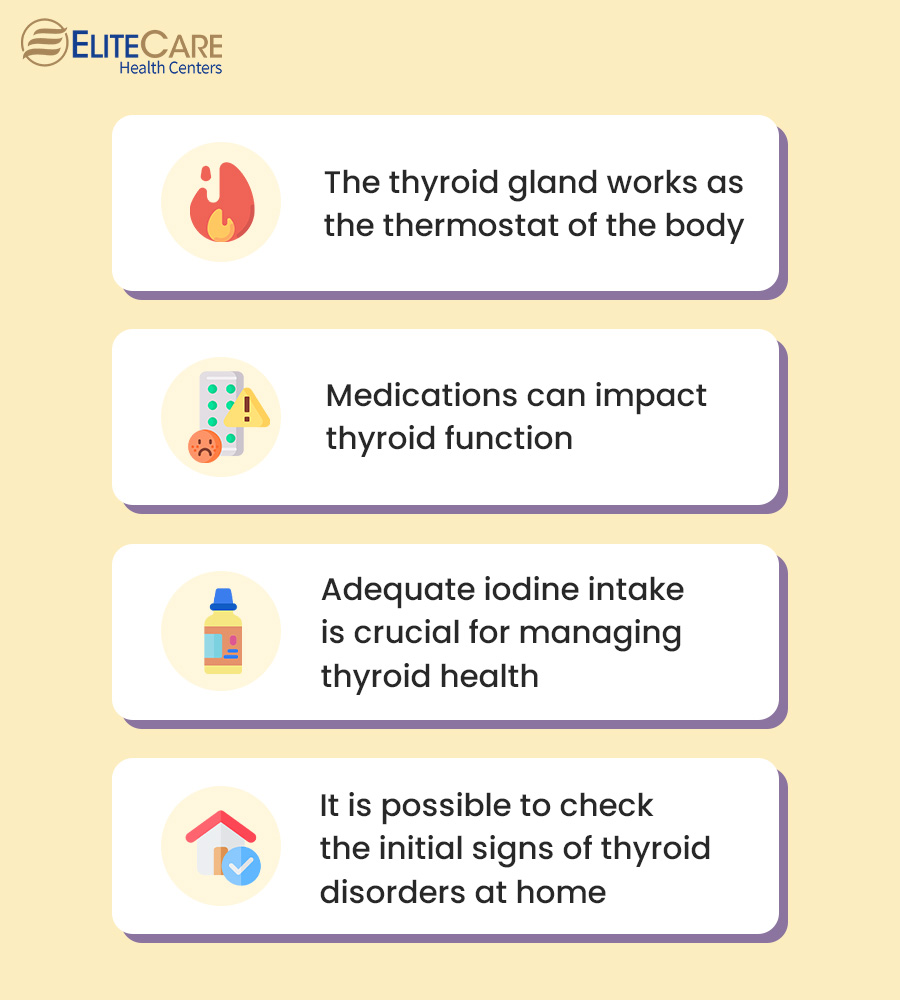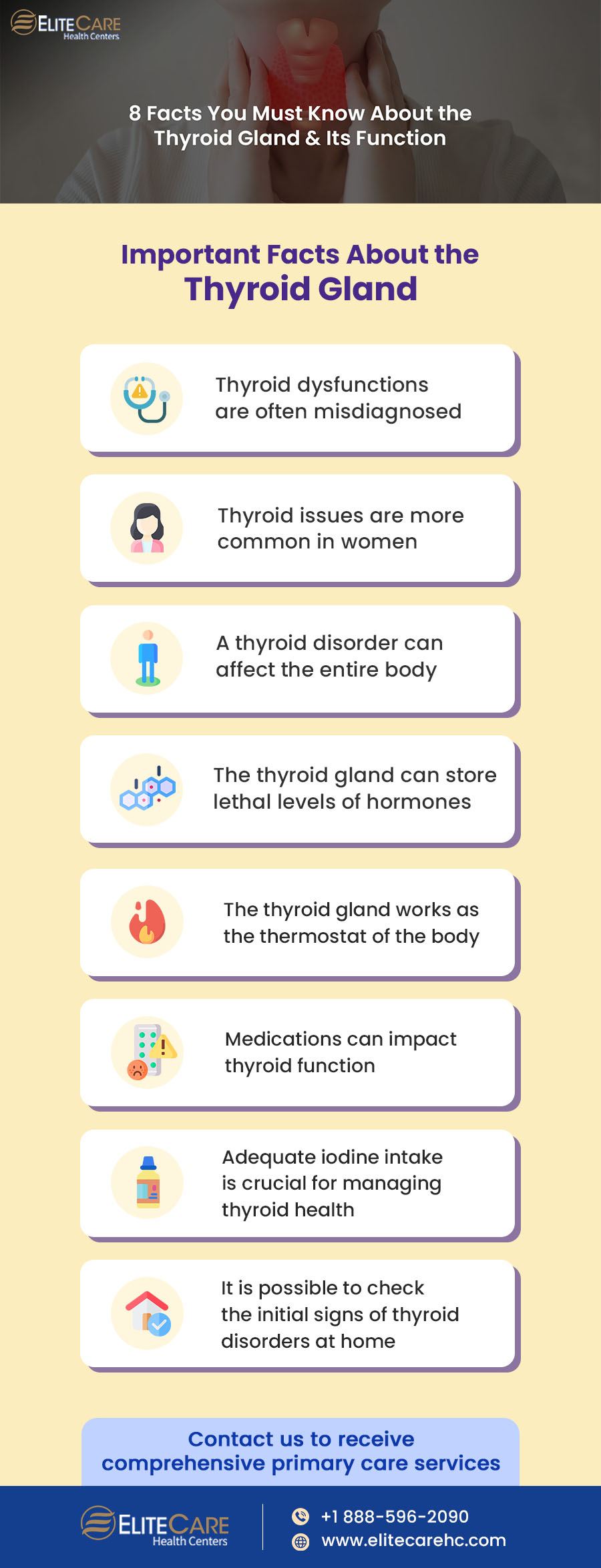
The thyroid is a small, butterfly-shaped gland located at the base of the neck, just below the larynx. It is controlled by the pituitary gland, a peanut-shaped gland in the brain. The thyroid gland produces thyroid hormones that regulate several bodily functions. Thyroid disorders can occur if there is an imbalance in thyroid hormone production, which can significantly affect overall health.
There are two primary types of thyroid conditions- hypothyroidism and hyperthyroidism. While hypothyroidism occurs when the thyroid gland does not produce enough hormones, hyperthyroidism happens when the thyroid gland produces an excessive amount of hormones.
In this blog post, we will share some important facts about the thyroid gland that will help in understanding what it is, and how thyroid problems can affect individuals. Read on to learn more.
8 Facts You Should Know About the Thyroid

1. Thyroid dysfunction is one of the most misdiagnosed conditions
The symptoms of thyroid disorders often go unnoticed because they are non-specific. While hypothyroidism manifests symptoms such as fatigue, weight gain, and depression, hyperthyroidism results in weight loss, anxiety, and rapid heartbeat. These symptoms are common to several other health issues and are not exclusive to thyroid disorders.
Since the symptoms of thyroid disorders are not specific in nature, it is crucial to visit a primary care physician and get routine annual exams done. During the routine exam, the physician may or may not recommend thyroid screenings after an initial checkup.
2. Thyroid issues are more common in women
According to the American Thyroid Association, women are five to eight times more likely than men to develop thyroid problems. This gender difference is observed across all ages and ethnic groups and is attributed to several factors.
One of the primary reasons is estrogen, a hormone that can affect the thyroid gland by increasing the amount of a protein called thyroid-binding globulin (TBG) in the bloodstream. This can impact thyroid hormone production and function, especially during pregnancy and menopause when estrogen levels change frequently.
In addition, women are more likely to inherit autoimmune diseases, including Hashimoto’s thyroiditis and Graves’ disease, which are the most common causes of hypothyroidism and hyperthyroidism. Research has also shown that the genes responsible for autoimmune thyroid disease are located on the X chromosome.
3. A thyroid disorder can affect the entire body
The thyroid hormones- triiodothyronine (T3) and thyroxine (T4) are essential for the metabolic functions of literally every cell in the body. By controlling the amount of oxygen delivered to the cells and the production of protein, these hormones stimulate nearly all tissues. As a result, when hormone production is disrupted, it can have widespread effects on multiple systems and organs throughout the body. The following are some effects of thyroid hormones on different functions of the body:
- Heart: Thyroid hormones affect your heart rate and relax the muscles in blood vessels to regulate blood flow.
- Liver: These hormones regulate metabolism and clear toxic substances from the liver. Hence, hormone imbalances can affect liver function and potentially lead to liver disease.
- Brain: Low thyroid hormone levels can cause forgetfulness, trouble in concentrating, and even lead to depression.
- Bones: Thyroid hormones play a critical role in bone metabolism, a process that controls bone resorption and bone formation. Therefore, when there is an imbalance in the hormones, bone loss can occur at a faster rate than new bone formation, potentially leading to osteoporosis.
- Fertility: These hormones regulate menstrual cycle and ovulation, leading to irregular periods if the hormones are imbalanced.
- Skin: An underactive thyroid can slow down the production and shedding of skin cells, leading to dry, dull skin and slower hair and nail growth.
- Weight: Thyroid hormones play a vital role in regulating metabolism. Therefore, hyperthyroidism (overactive thyroid) can increase the metabolism rate and cause weight loss while hypothyroidism (underactive thyroid) can lead to weight gain.
4. The thyroid gland can store lethal levels of hormones
The thyroid gland can store a considerable amount of thyroid hormones. If it releases that huge amount of hormones at once, it can lead to a rare but lethal condition known as thyrotoxicosis. However, thyroid hormones are closely monitored and regulated by signals that travel between the brain, gland, body tissues, and blood. These signals are sensitive and help ensure that the hormone levels are balanced at all times.
Individuals suffering from hyperthyroidism are at greater risk of thyrotoxicosis. Therefore, it is crucial to get regular check-ups done with a healthcare provider to detect any abnormalities in the thyroid gland early on. Also, do not forget to take prescribed medication to manage thyroid problems effectively.

5. The thyroid works as the body’s furnace
The pituitary gland works as the thermostat, instructing the thyroid gland when to turn on or shut off according to the body’s current temperature. When the body gets too cold, the pituitary gland produces Thyroid-Stimulating Hormone (TSH) to stimulate thyroid hormone production, which in return warms the body. When the thyroid hormones increase and the body gets too hot, the pituitary gland then slows the production of TSH.
6. Medications can impact thyroid functions
According to a review, some medications can increase or decrease thyroid function or the production of thyroid hormones in the body. These medications include Amiodarone, Glucocorticoid, Iodide, Lithium, Phenytoin, etc.
Individuals taking any of these medications should talk to their primary care physician to avoid any possible thyroid issues.
7. Iodine is crucial for thyroid health
The thyroid hormones are the only hormone that contains iodine. The thyroid gland obtains iodine from dietary sources and stores iodinated tyrosine, a type of amino acid, to maintain thyroid hormones in the event of iodine deficiency. Inadequate iodine intake can lead to enlargement of the thyroid gland.
To ensure sufficient iodine consumption, individuals may incorporate iodized table salt or consume natural sources such as dairy products, seafood, meat, and eggs. Visit a medical clinic and consult a primary care physician or a certified dietitian before taking any supplements or making any dietary changes.
8. It is possible to check thyroid at home
The American Association of Clinical Endocrinologists has recommended a simple self-exam once a month to detect the signs of thyroid problems at home.
- The first step is to use a handheld mirror to check the lower front area of the neck, above the collarbones, and below the voice box.
- They should tip their head back, take a sip of water, and observe the area for any abnormal growths, nodules, or enlargement.
- If any abnormality is visible, it may indicate the presence of a thyroid nodule or an enlarged thyroid, which could be a sign of hypo or hyperthyroidism. It is crucial to consult a doctor and get the required tests done to confirm the diagnosis.
The Bottom Line
According to the data revealed by ATA, approximately 20 million Americans are currently suffering from some form of thyroid disease, with up to 60% having no knowledge about their condition. There are no definite ways to prevent thyroid disorders because researchers are still trying to find out the exact causes behind these conditions. With adequate knowledge and widespread awareness, individuals can effectively manage their condition with the assistance of a healthcare provider.
For any queries or concerns about thyroid disorders, contact EliteCare Health Centers, one of the best medical clinics in Florida that offer senior care services. Contact us or visit your nearest healthcare center to schedule an appointment with our primary care physicians.






